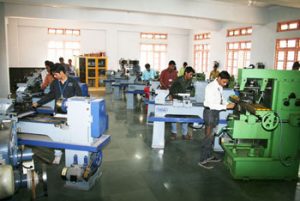Masters of Engineering in Mechanical (with specialization in Machine Design)
| Affiliated to | Duration | Academic Year | Sanctioned Intake | Exam Structure |
|---|---|---|---|---|
| Mumbai University | 2 years, Full Time | 2 semesters each | 12 | Theory, Practical, Oral, Term Work |


| Affiliated to | Duration | Academic Year | Sanctioned Intake | Exam Structure |
|---|---|---|---|---|
| Mumbai University | 2 years, Full Time | 2 semesters each | 12 | Theory, Practical, Oral, Term Work |


Message from Head of Department, Mechanical Engineering
The above video depicts the working of a CNC (Computer Numerical Control) machine. The Department of Mechanical Engineering is committed to support the students encouraging them with every facility possible. This rigor of the department towards new and upcoming technologies has led to the adaptation and incorporation of these technologies as part of the curriculum which is not even mandated by the University. Various such equipment are procured by the Department and are available for Under Graduate and Post Graduate students at their disposal.
PG program with Machine Design specialization prepares professionals for research and professional practice. The Department has well equipped laboratories for learning as well as solving real world industrial problems. The core faculty for Master course consists of reputed professors with high end teaching and or industry experience. Our PG programme educates competent engineering professionals who are equipped to work and lead in national, international companies and research organizations and well prepared for further doctoral studies. The objective of this program is to prepare graduates to provide the foundation for constructive design, production orientated tasks and functioning cooperatively within multi-disciplinary teams.
To establish a department of excellence in Mechanical Engineering encompassing design, manufacturing, and thermal sciences by providing high-quality education through teaching-learning process and research to meet the technological challenges.
To educate and prepare undergraduate students with theoretical and practical skills required for the successful career in mechanical and allied discipline with ethics and respect to the environment.
Program Outcomes (POs)
Engineering Graduates will be able to:
Program Educational Objectives (PEOs)
Program Specific Outcomes (PSOs)
The programme aims to develop in a graduate in Mechanical Engineering competencies, skills and abilities that would enable one to
